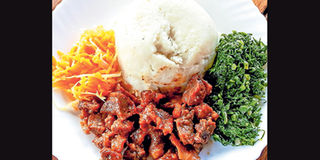Instant ugali coming soon on your plate

Innovators from the Jomo Kenyatta University of Agriculture and Technology (Jkuat) and University of Eldoret have come up with innovative ways to make ugali instantly. FILE PHOTO | NATION MEDIA GROUP
What you need to know:
- The user is only required to knead the mixture with water for a short while and, voila! ugali is ready in less than a minute.
- It was announced in the September issue of the Kenya Industrial Property Institute (Kipi) journal to kick-start the patent process.
- Benson Kariuki, the director of intellectual property management at Jkuat, predicts that it will be of help to many institutions.
- For the machine to be patented locally after its publication, it will take an elaborate process that involves a lot of correspondence with Kipi
Two universities, two different technologies, one end-product — ugali.
From the University of Eldoret, there is Unga Nutritious, created by its Department of Family and Consumer Sciences. It reaches consumers as flour, which only needs addition of hot water to make the meal.
The user is only required to knead the mixture with water for a short while and, voila! ugali is ready in less than a minute.
Prof Violet Mugalavai of the University of Eldoret, who came up with instant ugali flour, said it is a simple solution to the wastage of food after harvest.
And from the Jomo Kenyatta University of Agriculture and Technology (Jkuat), a machine for cooking ugali is in the offing.
It was announced in the September issue of the Kenya Industrial Property Institute (Kipi) journal to kick-start the patent process.
As per its description, the electric-powered machine has a mechanism that automatically sucks flour into an oven, stirs and kneads the mixture with boiling water by the use of sensors then when it detects that the maize meal is ready, it ejects it. It is armed with a programmable component and photoelectric sensors
“The automatic cooking machine is designed to stir and press maize meal to produce ugali like a human cook. It is easy to clean and repair,” says the description of the machine in the journal.
“It uses a standardised recipe and ratios, conserves energy and performs mass cooking within shortest time possible that is hygienic and economical,” adds the description.
ELABORATE PROCESS
Jkuat believes the machine, which was developed by final year students a few years ago, can be of great help to hotels, schools and other places where ugali is cooked in large quantities.
Benson Kariuki, the director of intellectual property management at Jkuat, predicts that it will be of help to many institutions.
“It is very easy to adopt and sell to schools, churches, and the big hotels that make a lot of ugali every day.
Remember, in Kenya we’re doing the cooking manually. They have two or three strong men who cook,” he said.
The machine was created by Evans Omondi, Clement Kirui Kiprotich, Alfayo Anyangu and Stephen Ondimu. Kariuki, a senior lecturer in Jkuat’s department of mechanical engineering, said there is a laid-down structure on how students and the university should share revenues if an invention is monetised.
For the machine to be patented locally after its publication, it will take an elaborate process that involves a lot of correspondence with Kipi.
Kariuki noted that innovations are driven by a people’s immediate needs as he dismissed critics who said food inventions should focus on maximising nutrition.
Fredrick Otswang’o, the patent drafting officer at Jkuat, said most ideas the university protects are spotted during exhibitions.
“Every year, we have a tech expo that is basically organised by students to showcase their ideas. From there, we pick a few we can protect and the College of Engineering’s final year students have their projects.
From that, it’s very easy to identify which ones are





